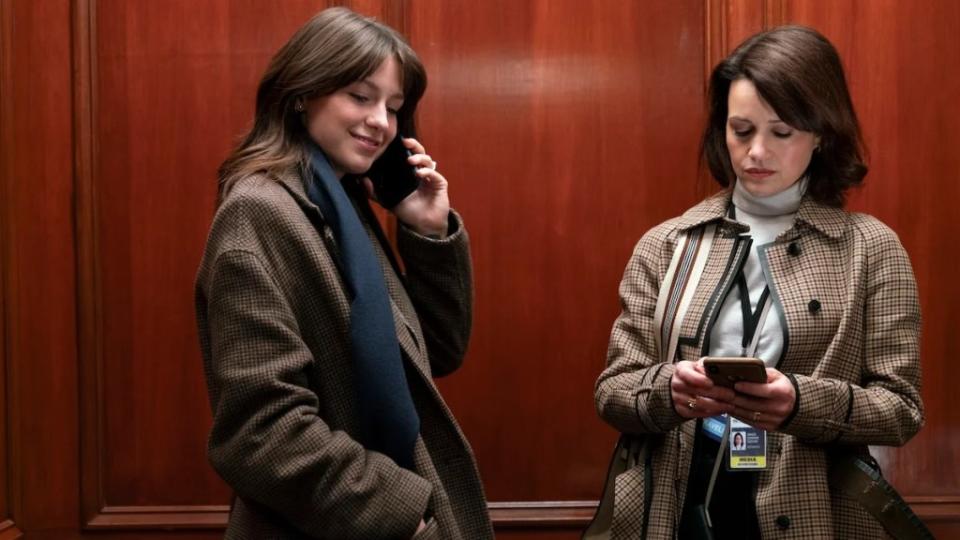‘The Girls on the Bus’ Review: Max Series Crashes Into Brain-Melting Alternate Political Universe
- Oops!Something went wrong.Please try again later.
- Oops!Something went wrong.Please try again later.
The most head-spinning, brain-melting alternate-universe TV show of the year so far isn’t technically science fiction. In fact, its source material isn’t fiction at all. “The Girls on the Bus” kinda-sorta adapts Amy Chozick’s campaign memoir “Chasing Hillary,” about the writer’s experiences covering Hillary Clinton’s presidential campaigns of 2008 and 2016. In doing so, the series fictionalizes the book (“inspired by” is the preferred nomenclature of the credits) so that its story isn’t literally about Hillary Clinton or Chozick herself.
It’s an understandable decision that nonetheless forces a time-travel-like effect on the show’s whole world.
To construct a series of fictional characters covering a contemporary presidential race whose outcome isn’t already known, Chozick and her series co-creator Julie Plec must build out a whole alternate timeline. So Sadie McCarthy (former Supergirl Melissa Benoist) begins the show having spent the previous election cycle covering a Hillary-like candidate, whose proximity to the White House inspired intense personal feelings from her. Now it’s seemingly 2020 (or a 2020-like year), and Democrats are vying for who gets to take down the unnamed (but not precisely Trump) Republican incumbent who beat out the Hillary proxy. These candidates include figures obviously inspired by Joe Biden (but not an ex-VP!), Pete Buttigeg (but straight!), Alexandria Ocasio-Cortez (but less popular!), and … the Hillary proxy again.
Just as awkward as jostling together a bunch of stand-in candidates to enact a for-dummies riff on 2020 is the set of actual leading characters “Girls on the Bus” assigns to cover the race: Four journalists boasting different backgrounds, affiliations and styles, none especially convincing in their embodiments of various stereotypes. In addition to Sadie, there’s hard-bitten scoop-master Grace (Carla Gugino), an old-school “objective” reporter who denounces the idea of journalists being so partisan as to actually vote in elections; Kimberlyn (Christina Elmore), whose politics as a conservative Black woman are tested by a cable outlet meant to resemble Fox News (or is it Newsmax?); and token youth Lola (Natasha Behnam), an “independent” voice with left-wing politics who broadcasts via social media and has next-to-zero idea of how any of this journalism stuff works.
If it’s hard to buy that these reporters could get along with themselves, let alone each other, it’s harder still to make sense of a quasi-political world where, say, the Steele dossier exists, but Trump does not; where it’s sometime in the early 2020s, but COVID-19 isn’t and hasn’t been happening; where abortion access has diminished, but it’s unclear whether this world’s Supreme Court has overturned Roe v. Wade. Granted, these quarrels might sound like a Star Trek fan nitpicking the physics of an alternate timeline or space travel — and admittedly, a few episodes into “Girls on the Bus,” it becomes easier to just roll with a soapy approach that’s more network-with-swears than HBO-level prestige. At that point, keeping track of a nonsensical alternate present can provide a welcome distraction from the paralyzing full-body cringes the show provides at regular intervals.
Determining the worst offender is a competition worthy of a presidential primary. Is it the way the show repackages Kimberlyn’s Newsmax-friendly views into a version of modern extremism vague enough to make her a palatable quasi-feminist figure? Is it the way the writers keep checking boxes for Lola (Brown! Queer! Body-positive! School shooting survivor!) rather than figuring out how to convincingly write a modern-day twentysomething without condescending to her? Perhaps the clichés of cynicism that a performer as gifted and charismatic as Carla Gugino must recite? But no, it’s probably the fact that Sadie is obsessed with legendary campaign reporters of yore, as chronicled in the seminal book “The Boys on the Bus,” about the journalists following the 1972 campaign — to the point of having imaginary conversations with an on-screen Hunter S. Thompson (P.J. Sosko), refashioned as a cutesy, supportive mascot who appears to be just a draft or two away from saying “you go, girl!”

Not even the dead can escape the vacuity of the show’s writing, which sends buzzwords, dumb quips, clunky not-exactly-current references, embarrassing paeans to the power of journalism, and musty work-life balance issues into its void. That said, Benoist bears the brunt of the damage, often meeting the show’s myriad tonal challenges by overacting and gesticulating like she’s in a zany rom-com.
It’s no surprise that many of the show’s staffers — Benoist (who also produces), Plec, and executive producers Greg Berlanti and Sarah Schechter — cut their teeth working for the CW, where this show was bound to land at one point. While that’s not an inherently bad thing — it does wonders for the show’s breakneck pacing, at least — the attempts to shape the material into something more entertaining, even aspirationally escapist, only undermine the occasional passages of despairing for our capital-d Democracy.
For all of the attempts to make its characters complicated, up-to-the-minute avatars of political anxieties, “The Girls on the Bus” sure likes to dole out assurances that even the dimmest or most bumbling journalists are bold hero-protectors at heart, and large-scale wrongdoing is just a cover-up away from exposure. Shots of the unlikely quartet sitting together on top of the press bus eating sandwiches and liquored-up whipped cream (Lola’s janky supply of products to endorse is one of the show’s few decent running gags) seem designed to evoke the funny grit of HBO’s “Girls,” only aimed at a demo that would find all that aimlessness and genuine provocation too untoward.
It all feels like 1996 doing a bad impression of 2024 — and it’s difficult to stomach recent history seen through such a glib, glossy filter.
“The Girls on the Bus” premieres Thursday, March 14, on Max.
The post ‘The Girls on the Bus’ Review: Max Series Crashes Into Brain-Melting Alternate Political Universe appeared first on TheWrap.

